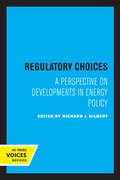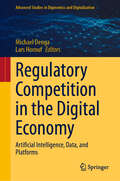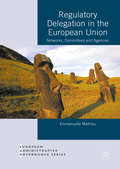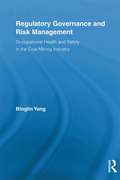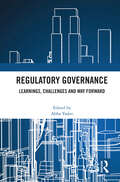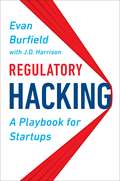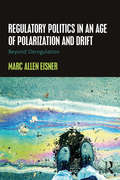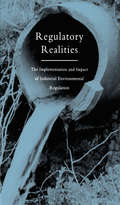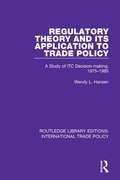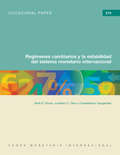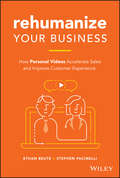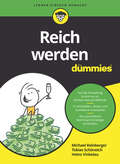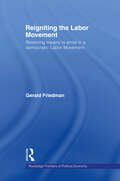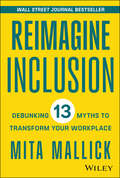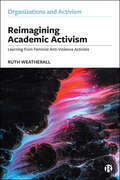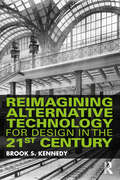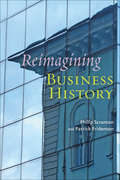- Table View
- List View
Regulatory Choices: A Perspective on Developments in Energy Policy
by Richard J. GilbertRegulatory Choices offers the first comprehensive economic history of energy policy and its consequences for California, where some of the most innovative and far-ranging programs of regulatory reform have originated. The authors of this volume have gathered together an impressive wealth of material about actual policy decisions and their repercussions and have subjected their findings to astute economic analysis. This book will serve for years to come as an invaluable reference on the costs and effects of various energy policies. With its focus on bringing prices in alignment with the true cost of producing power and delivering it to the customer, the first part of the book outlines the issue of setting utility rates and considers some of the proposals to provide regulated industries with incentives to respond to economic and environmental concerns. The problems of energy supply occupy the second part of the book, which includes a survey of the costs of alternative energy sources and estimates of their environmental impacts, as well as a case study of the construction of the Diablo Canyon nuclear power plant. The book concludes by documenting the results of subsidy programs that were designed to target the development of wind power and residential energy conservation. Regulators, we learn, have a mixed record when it comes to managing the production of energy. Some conservation programs have enjoyed considerable economic success, particularly those that correct a lack of consumer information. Others, such as the renewable energy tax credits or programs designed to subsidize new technologies, have cost much more than the value of the energy they have saved. What emerges clearly from this study is that regulated industries are not immune from the forces of competition. This title is part of UC Press's Voices Revived program, which commemorates University of California Press’s mission to seek out and cultivate the brightest minds and give them voice, reach, and impact. Drawing on a backlist dating to 1893, Voices Revived makes high-quality, peer-reviewed scholarship accessible once again using print-on-demand technology. This title was originally published in 1991.
Regulatory Competition in the Digital Economy: Artificial Intelligence, Data, and Platforms (Advanced Studies in Diginomics and Digitalization)
by Lars Hornuf Michael DengaThe digital economy is reinvigorating regulatory competition, yet little is known about which rules and jurisdictions can effectively bind companies nor what competitive motivations underlie certain rules. In addition to purely economic motives, legislators are now also driving the pursuit of digital sovereignty and the enforcement of social values in digital spaces. It also remains unclear what regulatory weight the self-regulation of private companies has in multi-level governance systems. This book examines regulatory competition in the three main pillars of digital markets: artificial intelligence, data, and platforms. It brings together legal scholars, economists and information systems experts, providing relevant examples and structured analysis of the aims and outcomes of regulatory competition in the digital economy. “A timely exploration of the balancing acts regulators must perform to manage private power in a globalized digital economy. Essential for understanding the intersection of law, economics, and technology in the contemporary digital ecosystem.” Jens Frankenreiter, Associate Professor of Law, Washington University “The book by Denga and Hornuf provides a comprehensive and timely exploration of the intricate regulatory challenges posed by big data, artificial intelligence, and platforms in the Digital Single Market. If offers critical insights for policymakers, scholars, and businesses navigating this evolving landscape.” Philipp Hacker, Professor for Law and Ethics of the Digital Society, European University Viadrin “Artificial Intelligence is fundamentally disrupting how we enable economic growth and how we regulate fair competition. Luckily, Denga and Hornuf provide a detailed and comprehensive overview of the thorniest and most complex regulatory issues while at the same time offering thoughtful and feasible solutions. "Regulatory Competition in the Digital Economy" is a treasure trove for anyone interested in market regulation, fair competition, consumer protection, and geopolitical questions.” Sandra Wachter, Professor of Technology and Regulation, Oxford Internet Institute
Regulatory Delegation in the European Union
by Emmanuelle MathieuThis book addresses the regulatory capacity of the EU as it responds to the huge challenge of realizing the single market. It explores its weaknesses, the EU regulatory networks, expert committees and EU agencies formed in response, and the exceptionally large and complex transnational regulatory system which has resulted. It defines the EU regulatory space as a multi-faceted phenomenon of institutional expansion whose shape varies across sectors and changes over time. Empirically based on the exploration of how regulatory delegation has emerged and evolved in three key EU policies (food safety, electricity, and telecommunications), the book disentangles and links together the functional, institutional and power-distributional factors and their interplay over time into a unified explanation of the many faces of the EU regulatory space.
Regulatory Frameworks for Hawala and Other Remittance Systems
by International Monetary FundA report from the International Monetary Fund.
Regulatory Governance and Risk Management: Occupational Health and Safety in the Coal Mining Industry (Routledge Advances in Management and Business Studies)
by Binglin YangRegulatory Governance and Risk Management will be the first book addressing the diffusion of risk-based governance in the coal mining industry from a health and safety standpoint. More specifically, it aims to understand a puzzling phenomenon. Since the 1990s, the approach of risk-based governance has been widely adopted in almost all developed countries in Europe and commonwealth countries. It, however, has diffused much more slowly in the U.S. Using a diffusion approach and comparisons between Australia and the U.S., this book examines mechanisms that both drive and prevent the diffusion of risk-based governance in the coal mining industry. This book has two major selling points. First, this is a timely work given the Upper Big Branch coal mine explosion occurred in April, 2010. After this disaster, many asked why an enhanced level of enforcement after 2006 has not prevented catastrophic accidents from occurring and why risk-based governance, which helps other countries achieve better safety performance, has been largely ignored in the U.S. This book answers these questions and makes recommendations on how to remove barriers in moving toward risk-based governance. Second, this book is readable because it embeds theories into storytelling and gives particular emphasis on the influence of key strategic individuals.
Regulatory Governance: Learnings, Challenges and Way Forward
by Abha YadavThis book explores the role of regulatory bodies and their emergence as the fourth branch of governments. It brings together professionals, academicians, and experts working in regulatory sector to present a foundational text on regulatory regime in India. From case studies to theoretical interventions, the book brings together a wide range of insights on an important but often neglected aspect of governance. It examines a range of themes including, the need for regulatory policy in a post-Covid world, regulatory excellence, impact of regulatory assessments, regulation of hazard, competition commissions, regulation of digital assets, stakeholder interests and investor activism, and anti-trust laws.The volume will be of great interest to scholars and researchers of law and governance, public policy and South Asian studies.
Regulatory Hacking: A Playbook for Startups
by Evan Burfield J. D. HarrisonEvery startup wants to change the world. But the ones who truly make an impact know something the others don't: how to make government and regulation work for them.As startups use technology to shape the way we live, work, and learn, they're taking on challenges in sectors like healthcare, infrastructure, and education, where failure is far more consequential than a humorous chat with Siri or the wrong package on your doorstep. These startups inevitably have to face governments responsible for protecting citizens through regulation. Love it or hate it, we're entering the next era of the digital revolution: the Regulatory Era.The big winners in this era--in terms of both impact and financial return--will need skills they won't teach you in business school or most startup incubators: how to scale a business in an industry deeply intertwined with government.Here, for the first time, is the playbook on how to win the regulatory era. "Regulatory hacking" doesn't mean "cutting through red tape"; it's really about finding a creative, strategic approach to navigating complex markets.Evan Burfield is the cofounder of 1776, a Washington, DC-based venture capital firm and incubator specializing in regulated industries. Burfield has coached startups on how to understand, adapt to, and influence government regulation. Now, in Regulatory Hacking, he draws on that expertise and real startup success stories to show you how to do the same. For instance, you'll learn how... * AirBnB rallied a grassroots movement to vote No on San Francisco's Prop F, which would have restricted its business in the city. * HopSkipDrive overcame safety concerns about its kids' ridesharing service by working with state government to build trust into its platform. * 23andMe survived the FDA's order to stop selling its genetic testing kits by building trusted relationships with scientists who could influence the federal regulatory community.Through fascinating case studies and interviews with startup founders, Burfield shows you how to build a compelling narrative for your startup, use it to build a grassroots movement to impact regulation, and develop influence to overcome entrenched relationships between incumbents and governments. These are just some of the tools in the book that you'll need to win the next frontier of innovation.
Regulatory Issues in Organic Food Safety in the Asia Pacific
by Goh Bee Chen Rohan PriceThe book seeks to address the intersection of food organics and the emergence of a new contractualism between producers, distributors and consumers, and between nation states. Additionally, it seeks to cater to the needs of a discerning public concerned about how its own country aims to meet their demands for organic food quality and safety, as well as how they will benefit from integration in the standard-setting processes increasingly occurring regionally and internationally. This edited volume brings together expert scholars and practitioners and draws on their respective insights and experiences in the field of organics, food and health safety. The book is organized in three parts. Part I outlines certain international perspectives; Part II reflects upon relevant histories and influences and finally, Part III examines the organic food regulatory regime of various jurisdictions in the Asia Pacific.
Regulatory Politics in an Age of Polarization and Drift: Beyond Deregulation
by Marc Allen EisnerRegulatory change is typically understood as a response to significant crises like the Great Depression, or salient events that focus public attention, like Earth Day 1970. Without discounting the importance of these kinds of events, change often assumes more gradual and less visible forms. But how do we ‘see’ change, and what institutions and processes are behind it? In this book, author Marc Eisner brings these questions to bear on the analysis of regulatory change, walking the reader through a clear-eyed and careful examination of: the dynamics of regulatory change since the 1970s social regulation and institutional design forms of gradual change – including conversion, layering, and drift gridlock, polarization, and the privatization of regulation financial collapse and the anatomy of regulatory failure Demonstrating that transparency and accountability – the hallmarks of public regulation – are increasingly absent, and that deregulation was but one factor in our most recent significant financial collapse, the Great Recession, this book urges readers to look beyond deregulation and consider the broader political implications for our current system of voluntary participation in regulatory programs and the proliferation of public-private partnerships. This book provides an accessible introduction to the complex topic of regulatory politics, ideal for upper-level and graduate courses on regulation, government and business, bureaucratic politics, and public policy.
Regulatory Realities: The Implementation and Impact of Industrial Environmental Regulation
by Joseph Murphy Andrew GouldsonArguing that the performance of industrial environmental regulation is determined by the level and nature of the innovation it stimulates, this text aims to analyze the influence of different structures and styles of implementation on innovation in regulated companies. Further aims include: examining the economic and environmental performance of different forms of innovation developed and applied by industry in response to regulation; describing the conditions under which industrial environmental regulation can be improved; outlining the implementation approaches required for regulated companies to overcome barriers which prevent them from exploiting the economic and environmental potential of particular forms of innovation; demonstrating how technological and organizational change could lead to lower costs and higher benefits from regulatory compliance; and putting forward to governments and industry proposals to improve the relationship between environmental protection and industrial competitiveness.
Regulatory Support for Off-Grid Renewable Electricity (Routledge Explorations in Energy Studies)
by Ngozi Chinwa Ole, Eduardo G. Pereira, Peter Kayode Oniemola, and Gustavo Kaercher LoureiroThis book investigates the role of law in enabling and addressing the barriers to the development of off-grid renewable electricity (OGRE). The limited development of OGRE is ascribed to a host of social, economic, and legal barriers, including the problem of initial capital costs, existing subsidies for conventional electricity, and lack of technological and institutional capacity. Through the analyses of selected case studies from Africa, Asia, Europe and North and South America, this book discusses the typical barriers to the development of OGRE from a global perspective and examines the role of the law in addressing them. Drawing together the lessons learnt from the case studies, this book offers robust recommendations on how the development of OGRE will support the goal of achieving universal access to low carbon, reliable, and sustainable electricity globally. This volume will be of great interest to students, scholars, policy makers, investors, and practitioners in the fields of energy law and policy, climate change, and renewable energy development.
Regulatory Theory and its Application to Trade Policy: A Study of ITC Decision-Making, 1975-1985 (Routledge Library Editions: International Trade Policy #23)
by Wendy L. HansenThe purpose of this book, first published in 1990, is to explain the varying levels of protection from foreign competition across US industries by focusing on factors that affect both the supply of and demand for the regulation of trade. What circumstances lead industries to request protection, and what factors affect the government’s decision of whether or not to supply that protection? What factors best explain the actions of interest groups and the decisions of regulators? This detailed study answers these key questions and more.
Regulatory Waves
by Mark Sidel Breen Oonagh B. Alison DunnAll governments, in various ways, regulate and control nonprofit organizations. Nongovernmental organizations (NGOs), while hopeful of supportive regulatory environments, are simultaneously seeking greater autonomy both to provide services and to advocate for policy change. In part to counter increasing statutory regulation, there is a global nonprofit sector movement towards greater grassroots regulation - what the authors call self-regulation - through codes of conduct and self-accreditation processes. This book drills down to the country level to study both sides of this equation, examining how state regulation and nonprofit self-regulation affect each other and investigating the causal nature of this interaction. Exploring these issues from historical, cultural, political, and environmental perspectives, and in sixteen jurisdictions (Australia, China, Brazil, Ecuador, England and Wales, Ethiopia, Ireland, Israel, Kenya, Malawi, Mexico, Tanzania, Uganda, Scotland, United States, and Vietnam), the authors analyse the interplay between state control and nonprofit self-regulation to better understand broader emerging trends.
Regulatory and Social Processes
by Robert S. Kaplan David P. NortonMany companies today recognize that achieving excellence in environmental, safety, health, employment, and community practices are part of long-term, value-creating strategies. Companies that excel in critical regulatory and social processes can enhance their reputation among customers and investors, and also help to attract and retain valuable employees who take pride in their companies. This chapter provides examples of how companies manage and report their regulatory and social performance along several dimensions, including environmental performance and employee practices.
Regulierung digitaler Geschäftsmodelle (Bibliothek des Wirtschaftsrechts #3)
by Christoph Perathoner Simon LaimerDieses Open Access Buch adressiert den Regulierungsbedarf im rasant wachsenden Bereich der digitalen Geschäftsmodelle. Der Trend zur Digitalisierung bringt rasche Veränderungen in Gesellschaft und Wirtschaft mit sich. Digitale Geschäftsmodelle bergen neben außerordentlichen Chancen auch nicht vernachlässigbare Risiken. In diesem Spannungsfeld zwischen wirtschaftlichem Nutzen und gesellschaftlicher Verantwortung besteht ein zunehmendes Bedürfnis nach gesetzgeberischer Regulierung der Digitalwirtschaft, die gleichwohl Innovation und Fortschritt im digitalen Sektor nicht unterbinden sollte. In diesem Open Access Band widmen sich ausgewiesene Expertinnen und Experten dem angerissenen Themenkreis aus den verschiedensten Blickwinkeln. Ausgangspunkt für das Buch bildete der vom Internationalen Forum für Wirtschaftsrecht getragene 3. Bozner Wirtschaftsrechtstag, bei dem besonderes Augenmerk auf die Berührung des deutschsprachigen Rechts- und Wirtschaftsraumes mit dem italienischen gelegt wird.
Regulierung von Künstlicher Intelligenz in der EU: Praxisbezogene Lösungsansätze für die Sicherheit von KI-Anwendungen (Vertrauenswürdige KI)
by Rainer Bernnat Jordan PötschDieses Buch bietet eine praxisorientierte Einführung in die Regulierung von Künstlicher Intelligenz (KI) in der EU. Es vereint theoretisches Wissen mit konkreten Handlungsempfehlungen zur Umsetzung von KI-Standards und Gesetzen, insbesondere im Rahmen des EU AI Acts. Durch eine speziell entwickelte Systematik werden KI-relevante Gesetze und Standards systematisch erfasst und bewertet. Führungskräfte, CISOs und Cybersecurity-Experten erhalten wertvolle Einblicke, wie sie die Vertrauenswürdigkeit von KI-Systemen in ihren Organisationen gewährleisten können. Ein besonderer Schwerpunkt liegt auf der Integration von KI in bestehende Sicherheitsstrukturen sowie der Nutzung bewährter Frameworks.
Regímenes cambiarios y la estabilidad del sistema monetario internacional
by Atish R. Ghosh Jonathan D. Ostry Charalambos TsangaridesA report from the International Monetary Fund.
Rehumanize Your Business: How Personal Videos Accelerate Sales and Improve Customer Experience
by Ethan Beute Stephen PacinelliAccelerate sales and improve customer experience Every day, most working professionals entrust their most important messages to a form of communication that doesn't build trust, provide differentiation, or communicate clearly enough. It's easy to point to the sheer volume of emails, text messages, voicemails, and even social messaging as the problem that reduces our reply rates and diminishes our effectiveness. But the faceless nature of that communication is also to blame. Rehumanize Your Business explains how to dramatically improve relationships and results with your customers, prospects, employees, and recruits by adding personal videos to emails, text messages, and social messages. It explains the what, why, and how behind this new movement toward simple, authentic videos—and when to replace some of your plain, typed-out communication with webcam and smartphone recordings. • Restore face-to-face communication for clarity and connection • Add a personal, human touch to your emails and other messages • Meet people who’ve sent thousands of videos • Learn to implement your own video habit in an easy, time-saving way • Boost your replies, appointments, conversion, referrals, and results dramatically If you’re ready to influence, teach, sell, or serve in a more personal way, Rehumanize Your Business is your guide.
Reich werden für Dummies (Für Dummies)
by Michael Kelnberger Tobias Schöneich Heinz VinkelauMit dem richtigen Mindset und dem nötigen Wissen können auch Sie reich werden. Beides vermittelt Ihnen dieses Buch. Es unterstützt Sie dabei, Macher-Qualitäten zu entwickeln, Chancen zu bewerten, kalkulierbare Risiken einzugehen und dann Ihr Geld für sich arbeiten zu lassen. Und es macht Sie schlau zu gewinnträchtigen Investment-Möglichkeiten: Immobilien, Aktien, Sachwerte, Kryptowährungen und Co. Erfahren Sie, wie Sie mit »Betongold« Geld machen können und wie Sie mithilfe der Technischen Analyse und der Fundamentalanalyse renditestarke Aktien kaufen. Entwickeln Sie Ihre persönliche Reichmach-Strategie!
Reifegradmanagement im Einkauf: Mit dem 15M-Reifegradmodell zur Exzellenz im Supply Management (essentials)
by Gerhard HeßMit dem 15M-Reifegradmanagement wird in diesem Essential ein praxiserprobtes Konzept zur nachhaltigen Entwicklung des strategischen Einkaufs vorgestellt. Alle relevanten Aufgabenfelder des Einkaufs werden im Modell strukturiert sowie auf ihre Reife hin analysiert und bewertet. Zu diesem Zweck wird ein mehrdimensionales Konzept zur Beurteilung der Reife im Einkauf und zur Ermittlung eines Reifegradscores entwickelt. Gerhard Heß zeigt, wie das Reifegradmanagement in das Einkaufsmanagement zu integrieren ist. Grundlegend ist dabei die Idee, dass ein exzellentes Einkaufsmanagement - ausgedrückt durch einen hohen Reifegradscore - die Basis für eine zukünftige hervorragende Einkaufsstrategie und deren Umsetzung ist.
Reigniting the Labor Movement: Restoring means to ends in a democratic Labor Movement (Routledge Frontiers Of Political Economy Ser. #Vol. 94)
by Gerald FriedmanA century of union growth ended in the 1980s. Since then, declining union membership has undermined the Labor Movement‘s achievements throughout the advanced capitalist world. As unions have lost membership, declining economic clout and political leverage has left them as weak props upholding wages and programs for social justice. Since the earlies
Reimagine Inclusion: Debunking 13 Myths To Transform Your Workplace
by Mita MallickReimagining what inclusion can look like in our organizations starts with understanding why these 13 DEI myths are not true—with practical and effective strategies for implementing transformative inclusivity. In Reimagine Inclusion, veteran DEI leader Mita Mallick debunks 13 myths that hold us back from transforming our workplaces. She delivers powerful storytelling combined with practical and hands on ways for us to be more inclusive leaders. She teaches us that when we show up as more inclusive leaders, we have the power to change our organizations, ultimately creating a ripple effect across our ecosystem. You’ll learn: How to understand, confront, and mitigate your own biases as you commit to do the work that starts with yourself. How to coach future leaders and to be intentional about how you lead in your organization—both in public and behind closed doors. To become an active participant in building your workplace’s culture. Reimagine Inclusion walks you through how to: understand the leader’s journey in your organization, interrupt bias at every key decision point, and transform your organization’s systems, processes, and policies to improve inclusivity at every level. This is a must have resource for managers and executives, founders and CEOs. Reimagine Inclusion is for anyone with a stake in building more inclusive, empathetic and resilient organizations, where each and every one of us can thrive.
Reimagining Academic Activism: Learning from Feminist Anti-Violence Activists (Organizations and Activism)
by Ruth WeatherallHow can we reimagine the relationship between academia and activism to provide new opportunities for social change? Based on an ethnography with an anti-violence feminist collective, this vibrant and vital book develops an interdisciplinary approach to activism and activist research, helping us reimagine the role of scholarship in the fight against social inequality. With its reflections on novel tools that can be utilized in the fight for social justice, this book will be a valuable resource for academics in critical management studies, sociology, gender studies, and social work as well as practitioners and policymakers across the social services sector.
Reimagining Alternative Technology for Design in the 21st Century
by Brook S. KennedyReimagining Alternative Technology for Design in the 21st Century presents a new approach to design that harnesses still-valuable alternative, traditional and abandoned technologies alongside the creation of new ones to address contemporary global problems. It focuses on design opportunities that reduce energy and material consumption to tackle issues such as climate change and pollution in industrialized economies. The book takes the reader on a journey surveying different facets of human activity to identify underused and discarded technologies that could be indispensable today. It critically addresses newer approaches to design and technology by comparing them to existing alternatives, unpacking examples including air conditioning with smart thermostats, electric lighting, durable reusable products, domestic maintenance tools and methods of transportation. Written for practicing designers and students in industrial design, architecture, sustainable design and human-centered design, this book provides new ideas and tools for creating more useful, energy-and-resource-efficient product designs and systems.
Reimagining Business History
by Philip Scranton Patrick FridensonA vigorous call for rethinking the field of business history.Business history needs a shake-up, Philip Scranton and Patrick Fridenson argue, as many businesses go global and cultural contexts become critical. Reimagining Business History prods practitioners to take new approaches to entrepreneurial intentions, company scale, corporate strategies, local infrastructure, employee well-being, use of resources, and long-term environmental consequences.During the past half century, the history of American business became an unusually active and rewarding field of scholarship, partly because of the primacy of postwar American capital, at home and abroad, and the rise of a consumer culture but also because of the theoretical originality of Alfred D. Chandler. In a field long given over to banal company histories and biographies of tycoons, Chandler took the subject seriously enough to ask about the large patterns and causes of corporate success. Chandler and his students found the richest material for theorizing about the course of business history in large companies and their institutional structures and cultures. Meantime, Scranton and others found smaller firms, those specializing in batch work as opposed to mass-produced goods, far closer to the norm and more telling.Scranton and Fridenson believe that the time has come for a sweeping rethinking of the field, its materials, and the kinds of questions its practitioners should be asking. How can this field develop in an age of global markets, growing information technology, and diminishing resources? A transnational collaboration between two senior scholars, Reimagining Business History offers direction in forty-four short, pithy essays.
